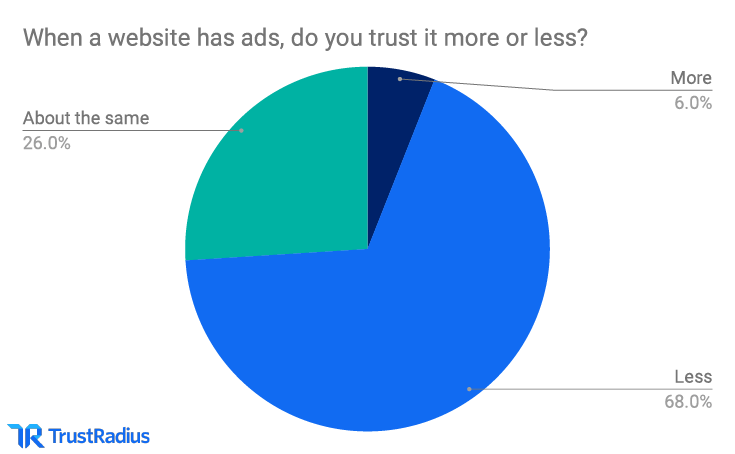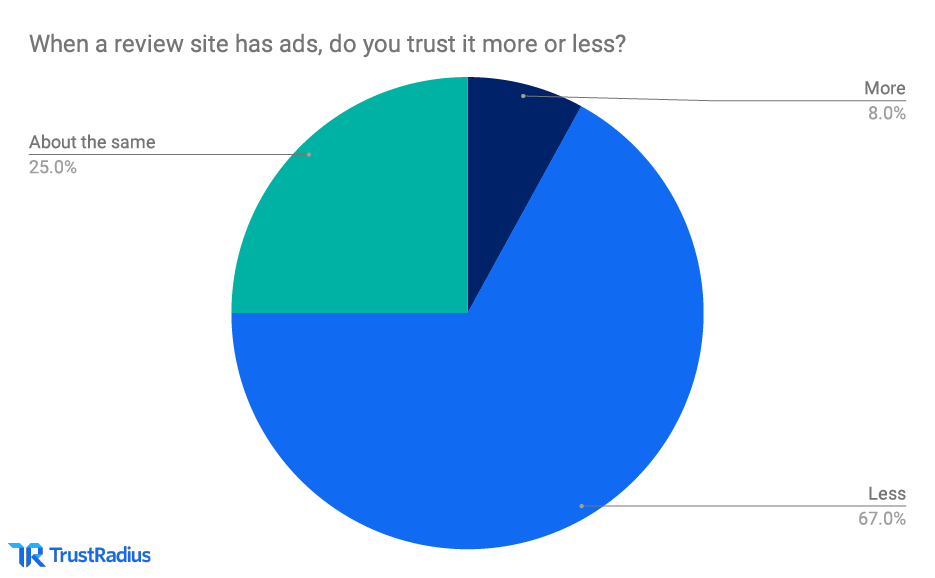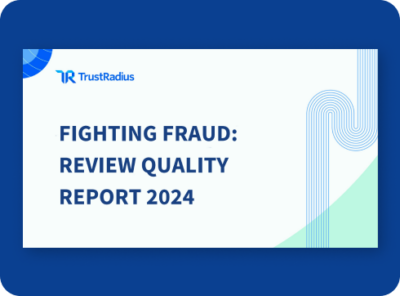
67% of Buyers Trust Review Sites With Ads Less
New research confirms professionals are more skeptical of information online when it appears in a context with ads.
Online ads diminish trust in website content. In a recent poll, more than 2 out of 3 professionals said they trust any website less when it has ads. Around 1 in 4 said they trust it about the same.

The poll showed the same phenomenon for review sites specifically. When asked, “What about review sites? Would ads make you trust reviews more or less?” 67% of respondents said site ads make them trust reviews less.

Source: June 2019 poll of 200 site visitors on www.trustradius.com
Whether on a review site or any site, it’s clear that buyers trust all content less when accompanied by ads. So in an era in which B2B buyers are using more sources than ever in their software buying journey, what should B2B marketers do to ensure they’re capturing valuable buyer trust?
In the rest of this post, we’ll lay out how ads on review sites affect buyer attitudes and behavior, and how business tech companies should use this research in developing a review strategy for their products.
What’s wrong with ads on review sites?
Alongside our poll, we asked respondents to share why ads on review sites make the reviews there less trustworthy. Seven top reasons emerged:
1. Feels like pay for play
One respondent explained the concern this way: “If they sell out to ads, who’s to say that the company they review isn’t paying for a high rating?”
Another commented: “I expect a review site to be unfiltered…ads would make me think advertisers could game the rankings.”
2. Introduces concerns about bias
“Ads are trying to sell me something – if a review site is getting paid to have ads how do I know if the reviews are truly unbiased?” said one respondent.
“With ads, (1) there’s the possibility the reviews are slanted toward advertising, (2) reminds me that the ads site may have a profit motive that could affect fairness (e.g. legal but ‘under the table’ payments),” explains another.
A third said it just raises the issue of “lack of independence from influence. If your platform requires advertising (I get why) then they [advertisers] also have power, both indirect and direct, to introduce bias.”
3. Creates a bad reputation for vendors
“Ads make me feel like a vendor is revenue oriented vs. service oriented,” one respondent pointed out.
Another added more detail, stating, “Website ads are intrusive and poorly executed. They look unprofessional and cheapen the brand of the company using them.”
“If you need ads your product must not be selling well. If you need a lot of ads that move the content around you are selling ads not products,” opined a third respondent.
4. Creates a bad reputation for review sites
Not only can ads be detrimental to the image of the company advertising their products, they can also lessen trust in the company that runs the review site–especially for buyers in the Discovery stage.
“I feel like they are helping competitors of the reviews I’m reading by turning me into a lead,” explained one respondent.
“They might be purposefully steering me to lesser products, if they get a higher return for clicks,” stated another.
“Sponsors give money for advertising. If someone was giving you money how many bad things would you say about them? ‘Don’t look a gift horse in the mouth’ comes to mind,” commented a third.
5. Intuition – it just doesn’t sit right
Several respondents described a subconscious, intuitive negative reaction to ads on review sites that makes them take information with a grain of salt.
“Can’t explain why. Just intuition…maybe it’s an evolutionary trait to suspect ideas from anyone seeking money/resources desperately. Who knows…” said one.
Another said simply, “I always feel like the ads are a sign the site is skewed.”
A third elaborated on this feeling: “Ads in general are annoying and have a tinge of dishonesty about them. It’s not that I directly associate them with the site I’m on and its trustworthiness, but instead that ads put you on guard, and subconsciously you’re more skeptical of any opinions.”
6. Raises security issues
A few more technical respondents said their lack of trust was related to potential security issues that can be introduced when ads are a part of website architecture.
“Websites with ads have some ‘opening’ that allows the ads to appear. I question the security of any website that has ports open to any public entity. As far as reviews on a website with ads…if the ads are related to the reviews, then no trust!” one such respondent explained.
Another listed a range of concerns with promotional ads being breached: “security issues, spoofing, spanning, ransomware, and hacktools.”
7. Just plain distracting
Various respondents said ads detract from their site experience, because they take up valuable real estate and make it harder to focus on the meat of the review content.
“Ads on a site show that the site is more interested in revenue than content. The more ads, the less focus on content. High quality content is king: builds trust and understanding. Sites with >3 ad locations are only interested in revenue and are avoided,” said one respondent.
This is especially true on mobile, where screen space is more limited, as another respondent explained: “I understand website owners need to be paid but too many ads increase annoyance ESPECIALLY on mobile where they take up valuable space. With review sites, I want to feel it is neutral and prefer to see products hyperlinked or ads VERY tastefully executed.”
Why did a small percentage of professionals say ads make content more trustworthy?
6% of respondents said they trust a website more when it has ads; 8% of respondents said they would trust reviews more on a review site with ads. These professionals are clearly in the minority. Their perspective is a bit curious. So we drilled in to ask them why they felt this way.
For the most part, respondents said that while they don’t like online ads, it does create some transparency around the website’s business model. When a site has ads, they can tell where at least a chunk of the site’s revenue is coming from. Though readers may find ads distracting from the content they came for, and it may negatively impact their site experience, these few appreciate that the monetization angle is out in the open for them to see.
A handful also felt the fact that solutions vendors were willing to advertise on review sites meant they took the reviews seriously, as content they knew their buyers would want to see.
How this impacts your investment in reviews
One of the main reasons we see vendors investing in reviews is to earn back some of the influence and control they’ve lost over the years, as buyers have adapted to become more savvy and self-directed. According to findings in the 2019 B2B Buying Disconnect report, 36% of buyers said the vendor they bought from had little to no influence over their purchase decision.
The same study shows a correlation between the trustworthiness of information sources and their influence over purchase decisions. Reviews were the #2 most-used information source for buyers, with 13% growth year-over-year. Reviews are highly trustworthy, and much more influential than vendor reps, case studies, references, blogs, or product websites.
But the bottom line is not all review sites are created equal. Some review sites allow companies to pay for better placement of their product listings, or run display ads on their own review listings, their competitors’ listings, and/or their category page. Others, like TrustRadius, do not. Technology buyers notice and appreciate this. It’s one of the top things buyers say they like when we ask them to review their experience on TrustRadius.
Evaluation criteria for review sites to ensure trust & influence
The presence or absence of ads isn’t the only factor about the review site that contributes to trust. Other factors include the level of detail and specificity in the review (which you can evaluate by looking at average word count and number of questions asked), the data quality on the site (i.e. authenticity of reviewers–are they real users?), and the level of context available about the reviewer’s identity and experience (e.g. name, company, title, industry, company size, photo, technology background, use case, verification with other social/professional profiles, etc.). You should vet potential review sites with all of these considerations in mind.
If reviews of your product appear on a site with ads, you’re not gaining the trust & influence you should
Where you invest matters. Whether your review strategy is early-stage or more mature, you want to make sure your time, your customers’ time, and the dollars you spend have the greatest impact. You might just be asking customers ad hoc to spend time posting a review somewhere. Or, you might be ready to spend serious money partnering with a review site to run invitation campaigns, understand the voice of your customers, plug social proof into your sales and marketing channels, and even report on review activity/buyer intent data.
Either way, you want to make sure your buyers are actually visiting the sites you’ve invested in, spending time there, and coming away more confident and educated. The less trustworthy your buyers feel your product reviews are, the less influence they’ll grant those reviews in their decision making process. That means you’re not getting the full ROI on your investment in reviews. Trust erodes when product reviews appear on websites with ads. With it goes influence.




